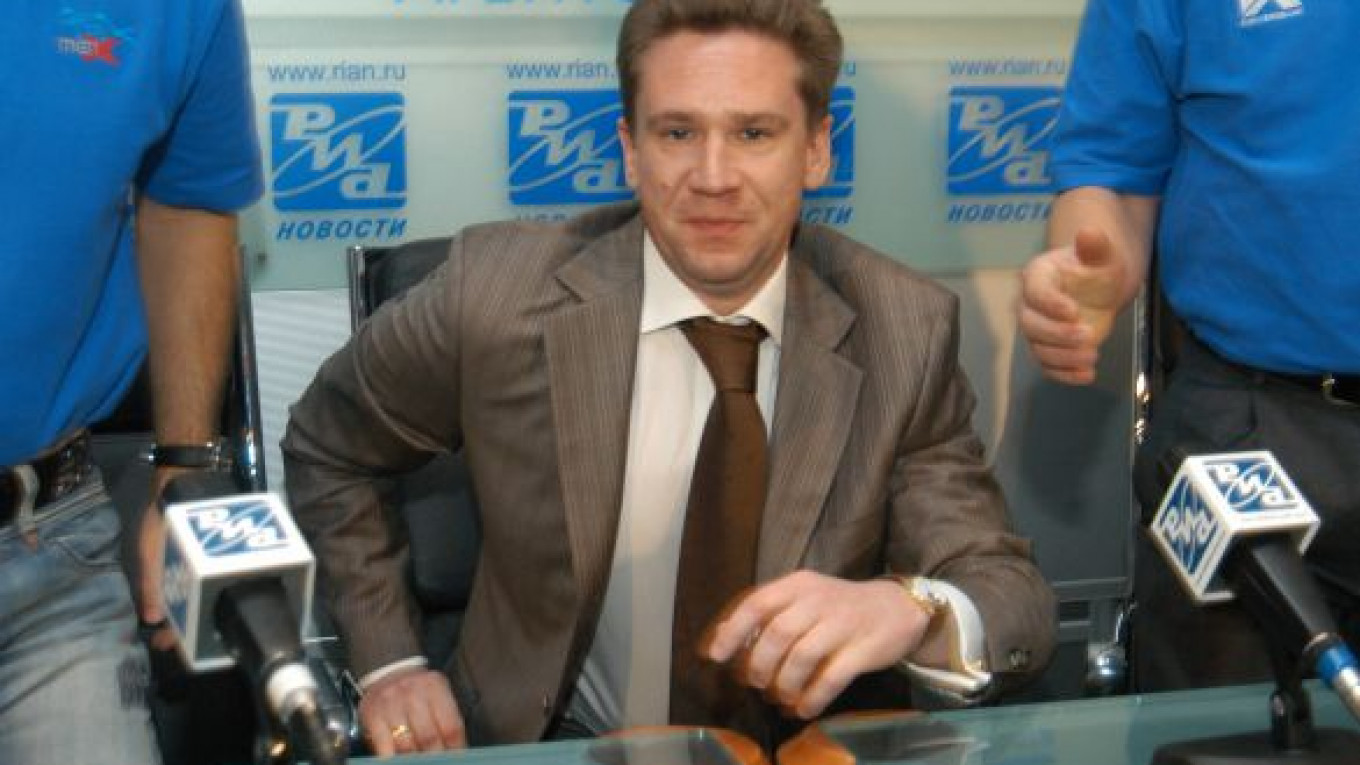Vladimir Antonov, the businessman accused of an asset-stripping operation that is the alleged cause of the collapse of two major Baltic banks, was released on bail by a London court Friday.
Vladimir Antonov and his Lithuanian business partner Raimondas Baranauskas were arrested by City of London police Thursday evening after the Lithuanian government issued an international arrest warrant.
Lithuanian prosecutors want the two on suspicion of massive embezzlement and document forgery — Baranauskas also faces charges of accounting fraud and abuse of authority at Bankas Snoras, the Lithuanian bank in which they were majority shareholders until it was nationalized last week.
Snoras was taken over by the Lithuanian government on Nov. 16 after the country’s central bank found what it said was a 1 billion litas ($385 million) hole in its assets.
On Monday of last week, authorities in neighboring Latvia seized control of a Snoras subsidiary, Latvjas Kraybank, saying they had found 100 million Latvian lats ($191 million) missing. The lender was Latvia’s 10th-largest bank by assets, The Associated Press reported.
The two men were bailed until Dec. 16 by the City of Westminster Magistrates’ Court on Friday. It is not yet clear how long the extradition process will take.
Baranauskas described the nationalizations as an attack on Antonov, telling the Lithuanian Respublika newspaper that he and his partner had willingly surrendered their passports to British authorities, proving that they “will not run” and have nothing to hide. He also hinted that the two might seek political asylum in Britain.
Both Baltic countries have imposed withdrawal limits to prevent a run on the affected banks.
Lithuanian central bank chief Vitas Vasiliaukas told reporters late Thursday that Snoras would be declared bankrupt because the government could not afford to bail it out.
“There is no sense in putting money into a plane which is not going to fly,” he told a news conference.
The Fitch Ratings agency slashed Snoras’ long-term credit rating to D, indicating credit default, before withdrawing the rating for the institution altogether in response to the announcement.
The decision dashed Latvian hopes of saving Latvyas Kraybank. Latvian Prime Minister Valdis Dombrovkis reportedly canceled a planned trip to Lithuania to persuade colleagues to save the bank after Vasiliaukas’ comments.
Snoras is the fifth-largest bank in Lithuania and the main bank in Antonov’s Moscow-based Convers group, which also includes a sports arm that controls Britain’s Portsmouth Football Club.
In a 2010 op-ed article in The New York Times, Antonov argued that accusations of shady dealings that have dogged him were a product of anti-Russian prejudice.
Earlier this year, such accusations helped scuttle his bid for a stake in troubled Swedish carmaker Saab.
Antonov tried to become a major shareholder in Saab after Swedish Automobile, then called Spyker, bought Saab early last year.
He owned nearly 30 percent of Spyker at the time — but GM, Saab’s former owner that still had preferred shares and an effective veto, forced him to sell his Spyker stake before they would let the deal go through, ostensibly because of allegations about his connections to organized crime.
He complied and earlier this year won a clean bill of health from Sweden’s Debt Office and GM for a direct investment in Saab, but the European Investment Bank — which had the right of veto because of a loan it had extended to the carmaker — still blocked his involvement.
Latvian officials on Wednesday said about 100 million lats ($200 million) was stripped out of Latvyas Kraybank to fund Antonov’s investment projects, including the ill-fated Saab bid.
The Russian Central Bank denied Convers access to the deposit insurance system in 2003, RBK daily reported.
Convers Sports Initiatives, the subsidiary that owns the club, said on its web site that it was “operationally unaffected” by the Snoras nationalization.
A Message from The Moscow Times:
Dear readers,
We are facing unprecedented challenges. Russia's Prosecutor General's Office has designated The Moscow Times as an "undesirable" organization, criminalizing our work and putting our staff at risk of prosecution. This follows our earlier unjust labeling as a "foreign agent."
These actions are direct attempts to silence independent journalism in Russia. The authorities claim our work "discredits the decisions of the Russian leadership." We see things differently: we strive to provide accurate, unbiased reporting on Russia.
We, the journalists of The Moscow Times, refuse to be silenced. But to continue our work, we need your help.
Your support, no matter how small, makes a world of difference. If you can, please support us monthly starting from just $2. It's quick to set up, and every contribution makes a significant impact.
By supporting The Moscow Times, you're defending open, independent journalism in the face of repression. Thank you for standing with us.
Remind me later.


